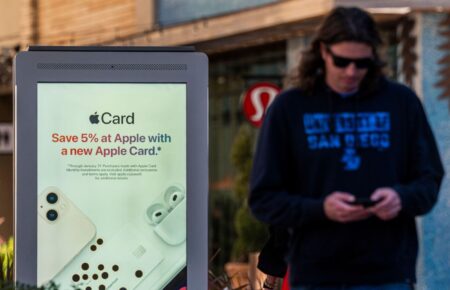Republican Lawmaker Proposes 18% Cap on Credit Card Interest Rates
Credit card companies should be barred from setting interest rates higher than 18%, a Republican lawmaker from Missouri proposed Tuesday. If passed, U.S. Senator Josh Hawley’s bill, the Capping Credit Card Interest Rates Act, would also block credit card companies from introducing new fees aimed at evading the cap and penalize lenders with annual percentage rates that exceed 18%. Hawley’s bill comes as Americans are grappling with record-high credit card rates while carrying slightly more than $1 trillion in card debt. The average credit card rate has been inching toward 21% for the past three months and was 20.68% as of last week, making it more expensive for consumers to carry balances, according to Bankrate data. [CBS News]
Buy Now Pay Later Usage in U.S. Doubled Since 2021
Nearly a tenth of Americans, 8%, have used Buy Now Pay Later credit financing for online purchases in the last year, a 2x increase since 2021, a YouGov report finds. Americans across every generation have increased adoption of BNPL since 2021, with millennials representing the largest growth segment (increasing by 91%). Meanwhile, online credit card usage among U.S. millennials has dropped by 4% during the same time period. The report identifies that among U.S. BNPL users, 49% have less than $1,000 saved versus 30% of the general population. [Payments Dive]
Credit Cards, Debit Cards Most Popular for Holiday Shopping
Rising interest rates and inflation are expected to impact holiday shopping habits. Credit cards are expected to be the most popular payment method for holiday shopping, according to a survey by consumer financial services company Bankrate. More than half (53%) of holiday shoppers say they expect to pay for at least some of their purchases with a credit card, including 19% who say they will take on credit card debt for their holiday purchases. Debit cards are a close second, with 52% of shoppers planning to use a debit card. Only 10% of holiday shoppers plan to use a buy-now, pay-later service, and 5% to plan to pay with checks. [Chain Store Age]
Average Overdraft Price Hits 19-Year Low
The average price of a consumer overdraft dropped by 11% this year, according to a new survey from Bankrate.com, as the banking industry continued moving away from the charges amid persistent regulatory pressure. Though most banks still charge overdrafts, the average fee fell to $26.61 from $29.80 last year, the annual survey found. The fees peaked at $33.58 in 2021. Larger banks started announcing overdraft reforms that year. Ally Bank eliminated overdraft fees, a move that Capital One and Citigroup would soon follow. Bank of America slashed its fee to $10, and a few regional banks followed suit in reducing the charges. [American Banker]
Xbox Teams With Mastercard to Unveil First Credit Card
Microsoft-owned gaming platform Xbox is debuting its first co-branded credit card in the U.S. The Barclays-issued Mastercard will be available on Sept. 21 exclusively to qualified Xbox Insiders across the country before becoming open to the general public in the U.S. starting next year. The card comes with a variety of perks, like three months of Xbox Game Pass Ultimate for users who make their first purchase within 180 days of opening their account, and 3X card points on certain streaming platforms and dining delivery services. [PYMNTS]
Delta to Slash Sky Club Access for Amex Card Holders, Change How You Earn Elite Status
Bad news, Delta fans: it’s soon going to be a lot harder to access Delta Sky Clubs and earn Medallion elite status. On the Sky Club side, those with premium American Express cards will have their lounge access cut from unlimited visits to as few as six visits per year, depending on which card they have. These changes take effect in 2025. The airline will completely change how it awards Medallion elite status next year. Starting next year, there will only be one metric, Medallion Qualifying Dollar, and requirements are much higher than what they are today. And to make matters worse, the MQD waiver offered by popular Delta credit cards is going away. [CNN]
Hallmark Lets Consumers Venmo Gift Cards as DoorDash and Costco Up Digital Too
To adapt to the evolving preferences of Gen Z shoppers when it comes to gift-giving, Hallmark is embracing modern avenues such as digital payments and mobile apps. In late August, Hallmark forged a partnership with Venmo to introduce over a dozen co-branded physical greeting cards. These cards, accessible online and at Hallmark, CVS and Walgreens outlets, feature a QR code directing users to Venmo. The giver utilizes the code to transfer funds to the recipient while the recipient scans the code to receive the payment. These cards are available for purchase at $4.99 each and come in a range of themes, including “Happy Birthday” and “Best Christmas Ever.” Two years ago when Hallmark started integrating personalized videos into its physical cards through QR codes. It also introduced a mobile app that empowers customers to customize cards directly on their smartphones. [PYMNTS]
A New ‘Risk Score’ Is Generated
Artificial intelligence is reaching into all corners of financial services, and that obviously includes payments. Mastercard is reporting it has introduced a new solution that uses AI to generate a “risk score” for transactions to evaluate the legitimacy of the person on the receiving end of a digital payment. The move comes in the wake of real-time payments and the official introduction by the Federal Reserve of its FedNow service. While it’s good news for those making or expecting payments, it has also opened the door to fraudsters, making it easier for crooks who impersonate an individual or company to trick a person into sending money and then to escape with the funds. Known as authorized push payment fraud, it has been growing markedly in the United Kingdom and it’s expected to become a large issue in the U.S. as real-time payments take greater hold. [CU Today]
Mastercard and Paysend Deepen Cross-Border Payments Tie-Up
Mastercard is extending its partnership with Paysend aimed at enhancing cross-border payments for small-and-medium-sized businesses (SMEs). SMEs are increasingly seeking new ways to send money abroad or pay vendors around the globe. Indeed, despite the disparity in scale between SMEs and large enterprises, small firms make up over 98% of European imports and exports. Nearly 40% of SMEs surveyed in a Mastercard report say that cumbersome cross-border payments processes are slowing down their supply chain, with a quarter stating that they had lost suppliers as a result. [FinTech Magazine]
Do Gift Cards Need to Be Plastic? Hallmark, Blackhawk Test Paper Options
Facing rising payment card environmental-impact concerns, card networks and banks are switching from harmful virgin plastic to using recycled and biodegradable materials for credit and debit cards. Now gift cards are going green too, using paper. Gift-card giant Blackhawk Network this month announced plans to roll out more sustainable paper-based versions of its Visa gift cards as part of a long-term plan to end reliance on first-use plastic for more than 700 million cards the company helps produce annually. The first wave of paper-based Visa prepaid gift cards will roll out in the U.S., Canada and Australia beginning this fall. [American Banker]
10 Ways to Reduce Your Credit Card Processing Fees
Swipe fees take a bite out of most non-cash payments. Reducing merchant credit card fees can improve your bottom line. But your strategy depends on your transaction volume, industry, and customer base. Use these tips to lower the costs of processing credit cards. [U.S. Chamber]
Read the full article here













